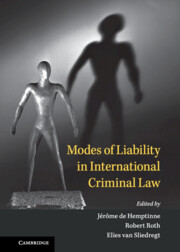Book contents
- Modes of Liability in International Criminal Law
- Modes of Liability in International Criminal Law
- Copyright page
- Contents
- Biographies
- Acknowledgements
- Abbreviations
- 1 Cross-Cutting Issues
- Part I Individual Commission
- Part II Joint Commission
- Part III Participation
- Part IV Participating in Group Activities
- Part V Inchoate and Preparatory Acts
- Part VI Other Forms of Responsibility
- Part VII Concluding Observations
- Index
- References
Part III - Participation
Published online by Cambridge University Press: 01 July 2019
- Modes of Liability in International Criminal Law
- Modes of Liability in International Criminal Law
- Copyright page
- Contents
- Biographies
- Acknowledgements
- Abbreviations
- 1 Cross-Cutting Issues
- Part I Individual Commission
- Part II Joint Commission
- Part III Participation
- Part IV Participating in Group Activities
- Part V Inchoate and Preparatory Acts
- Part VI Other Forms of Responsibility
- Part VII Concluding Observations
- Index
- References
Summary
Historically, aiding and abetting, as such, was not included in the Charter of the Nuremberg Tribunal or the Charter of the Tokyo Tribunal. Rather, Control Council Law No. 10 first provided for the criminal prosecution of persons who were ‘accessor[ies] to the commission of any … crime or ordered or abetted the same’. Oddly, aiding and abetting was also not explicitly included in the 1950 Nuremberg Principles or the 1954 ILC Draft Code of Crimes – in both documents ‘complicity’ is employed – but it reappeared in Article 3(2) of the 1991 ILC Draft Code of Crimes and in Article 2(3)(d) of the 1996 ILC Draft Code of Crimes. Nonetheless, it is now consistently found in the Statutes of all modern international criminal tribunals.
- Type
- Chapter
- Information
- Modes of Liability in International Criminal Law , pp. 171 - 306Publisher: Cambridge University PressPrint publication year: 2019



